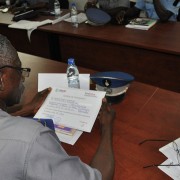Speeches Shim
More than one billion people are affected by one or more of the world's neglected tropical diseases. In Côte d'Ivoire, five neglected tropical diseases constitute a public health concern because of the serious socio-economic impact. USAID works alongside the Ministry of Health and Public Hygiene in the fight against neglected tropical diseases including: lymphatic filariasis or elephantiasis, soil-transmitted helminthiasis, schistosomiasis, onchocerciasis and trachoma.
The crisis that erupted after the contested 2010 presidential election results in Côte d'Ivoire left the country deeply divided, with over 3,000 people dead and great doubt about a the prospect of future peaceful elections and transitions of power. After the 2010 crisis, anxiety about the 2015 election lingered and affected the thinking of many about what it would mean for Côte d'Ivoire. Would it reignite the recent conflict? Would the election be fair and transparent with credible results – both in perception and in actuality? These are the reasons why the United States Agency for International Development (USAID) partnered with the Consortium for Elections and Political Process Strengthening (CEPPS) and 14 civil society organizations to form an independent platform to provide outside verification of the credibility of the election outcome.

With the support of USAID, the Ivoirian Government is making significant strides rebuilding the rule of law and restoring public confidence in the justice sector after years of unrest and stagnation. In particular, the USAID-funded Justice Sector Support Program (“ProJustice”) is carrying out intensive capacity building activities such as nationwide joint trainings of prosecutors, investigating judges, and judicial police officers (JPOs). The result has been improved communication, cooperation, and effectiveness of investigations, prosecutions, and court cases
The insecurity and unrest in the early 2000s and the violence after the 2010 election disrupted the justice sector in Côte d'Ivoire. This instability led to widespread looting and destruction of infrastructure in the judicial branch and throughout the government. Only recently have judges and prosecutors started returning to their posts, but the country is still facing challenges that are common in post-conflict societies, like land disputes, vulnerable populations confronting social exclusion, gender-based violence, and disaffected youth.
In 2011, after 12-years without a parliamentary election, the people of Côte d'Ivoire elected new representatives to the National Assembly. After that election, the new lawmakers required additional support because of the absence of a consistent, effective, and transparent government. The USAID Office of the Development Counselor launched a five-year Legislative Strengthening Project in December, 2012 to support the members of the National Assembly in their essential governing roles and functions.


Comment
Make a general inquiry or suggest an improvement.